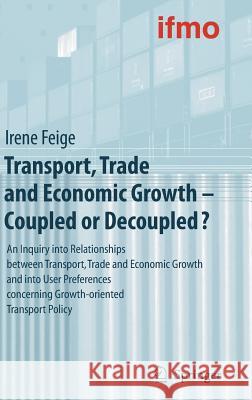Transport, Trade and Economic Growth - Coupled or Decoupled?: An Inquiry Into Relationships Between Transport, Trade and Economic Growth and Into User » książka
Transport, Trade and Economic Growth - Coupled or Decoupled?: An Inquiry Into Relationships Between Transport, Trade and Economic Growth and Into User
ISBN-13: 9783540682967 / Angielski / Twarda / 2007 / 119 str.
Transport, Trade and Economic Growth - Coupled or Decoupled?: An Inquiry Into Relationships Between Transport, Trade and Economic Growth and Into User
ISBN-13: 9783540682967 / Angielski / Twarda / 2007 / 119 str.
(netto: 383,36 VAT: 5%)
Najniższa cena z 30 dni: 385,52
ok. 22 dni roboczych.
Darmowa dostawa!
Over the past decade, the transport industry has become an increasingly popular scapegoat for polluting the environment with emissions and noise. Therefore, additional transport infrastructure investments, especially in road transport, are becoming more and more contentious. Conversely, the advocates of free trade stress the importance of transport to enhance economic growth and subsequently the standards of living. Thus, political decision makers and business people alike are facing the challenge of reconciling these conflicting ideas. Though being one of the most prominent topics in public discussion, hard facts are still rare. In order to analyze the question from a different perspective, this book sets out to combine different approaches from economics as well as business administration to stimulate scientific discourse and to support decision-makers in their efforts to ameliorate the situation. The first part of this book contributes to the empirics of the relationship between transport and economic growth, or more specifically, whether "decoupling" of transport and economic growth appears possible. For this purpose previously unavailable regional data for Italy and Germany were collected and analyzed. The results indicate that transport makes an important contribution to economic growth. Therefore, the second part of this book goes into more detail. Given the economic importance of transport and the resistance against the expansion of the transport infrastructure, it is essential to make efficient use of the already existing transportation network. For this purpose the author investigates which characteristics of transport are perceived as most important by decision makers, applying an adaptive conjoint analysis. The results show that transport quality in terms of timeliness, reliability, etc. seems to be at least as important as the monetary transport costs.











